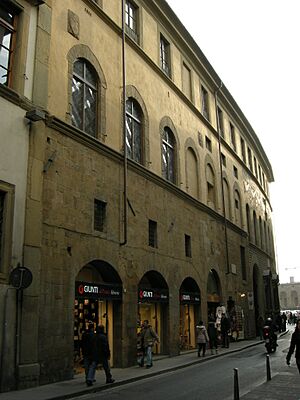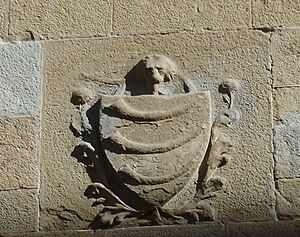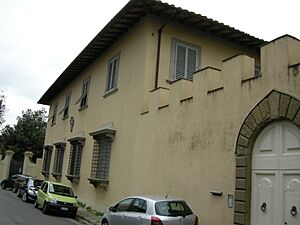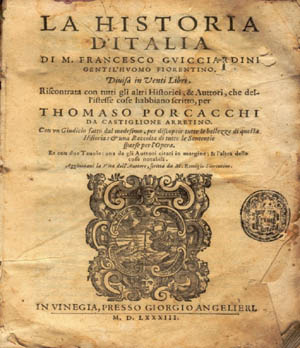Francesco Guicciardini facts for kids
Quick facts for kids
Francesco Guicciardini
|
|
|---|---|
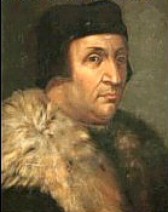 |
|
| Born | 6 March 1483 Florence, Republic of Florence
|
| Died | 22 May 1540 (aged 57) Arcetri, Duchy of Florence
|
| Nationality | Italian |
| Occupation | Historian, statesman |
Francesco Guicciardini (born March 6, 1483 – died May 22, 1540) was an important Italian historian and statesman. He was a friend and also a critic of Niccolò Machiavelli. Many people see him as one of the most important political writers of the Italian Renaissance. In his most famous book, The History of Italy, Guicciardini started a new way of writing history. He used official government documents to support his ideas and gave a real look at the people and events of his time.
Contents
Biography
Early life and education
Francesco Guicciardini was born in Florence, Italy, on March 6, 1483. At that time, Florence was a powerful city-state called the Republic of Florence. He was one of 11 children. His family, the Guicciardini, were very important and wealthy members of Florence's ruling class, which was a group of powerful families. They also supported the Medici family, who were very influential. Many of Francesco's ancestors had held high positions in the government for a long time.
Francesco's father, Piero, was a scholar. He made sure Francesco received an excellent education. Francesco studied classic subjects like Latin and some Greek. He then went on to study law at the Universities of Ferrara and Padua until 1505.
After finishing his studies, Francesco thought about becoming a priest. However, his father believed the Church was not in a good state. So, Francesco decided to focus on law instead. When he was only 23, he was chosen by the Florentine government to teach law in Florence.
In 1508, he married Maria Salviati. This marriage connected him to another powerful family in Florence. Around this time, he also started writing about his family's history and his own life.
Working as a diplomat in Spain
Because he was so good at law, the government of Florence sent Guicciardini to be a diplomat in Spain in 1512. He had some doubts about taking the job because it didn't pay much and would take him away from his law practice. But his father convinced him that it was a great honor to be chosen at such a young age. He wrote in his diary that "No one could remember at Florence that such a young man had ever been chosen for such an embassy." This was the start of his career as a diplomat and statesman.
While in Spain, he wrote many letters back to Florence. These letters show how good he was at observing and understanding political situations. He learned a lot about how politics really worked. He also saw how strong the Spanish army was. However, he didn't fully trust King Ferdinand the Catholic, seeing him as very clever at political tricks.
During his time in Spain, the Medici family returned to power in Florence. Guicciardini wanted to go back home and be part of the new government. He eventually returned to Florence in 1514 and continued his law practice. He also served in important government roles.
Serving the Popes
In 1513, Giovanni de' Medici became Pope Leo X. This meant Florence was now under the Pope's control. Many Florentines, including Francesco, found new opportunities to work for the Pope. In 1515, Pope Leo X made him governor of Reggio and then Modena. This was the start of a long career for Guicciardini working for the Popes, first for Leo X and then for Clement VII. He was very successful in governing these cities.
Later, in 1523, Pope Clement VII made him a high-ranking official in the Romagna region. This made Guicciardini almost like the ruler of the Papal States in that area. He described himself during this time, saying his house was full of important people and that everyone, even the Pope, looked to him for decisions.
Italy was facing a lot of political trouble. The kings of France and the Holy Roman Empire were fighting. The Pope asked Guicciardini for advice on which side to support. Guicciardini suggested an alliance with France, which led to a war with the Holy Roman Emperor. Later, when the Emperor's army threatened to attack, the Pope made Guicciardini a general of the papal army.
In 1527, Guicciardini managed to stop an attack on Florence. However, the rebellious army then turned towards Rome. Soon after, news came that Rome had been attacked and looted in what is known as the Sack of Rome. The Pope was even imprisoned.
Guicciardini worked for three different Popes for about 20 years. Because of his experiences, he had some strong opinions about the Church leaders. He believed that the Church leaders were too focused on money and power. He wished they would stick to their religious duties.
The Florentine Republic
Like many important Florentines, Guicciardini believed in a government where power was shared, similar to the Venetian system. Even though he worked closely with the Medici family, he thought their rule was like a dictatorship. However, he still supported the Medici because he believed that a strong leader, chosen by the people, could help a republic last.
After the Sack of Rome, Guicciardini returned to Florence. But by 1527, the Medici family had been forced out of the city, and a new republic was set up by people who strongly disliked the Medici. Because Guicciardini had worked so closely with the Medici, he was not trusted in his hometown.
In March 1530, his property was taken away, and he was declared a rebel because of his past work for the Medici.
This new Florentine Republic didn't last long. After a long siege by the Emperor's troops, Florence surrendered in 1530. The Pope then put Guicciardini in charge of punishing those who had fought against the Medici.
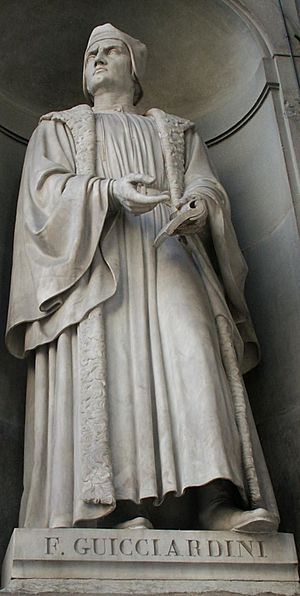
Final years and retirement
In 1531, Pope Clement VII made Guicciardini the governor of Bologna, an important city in the northern Papal States. When the Pope died in 1534, Guicciardini resigned and went back to Florence. He became an advisor to Alessandro de' Medici, who was the new Duke of Florence. Guicciardini even defended Alessandro in front of the Emperor Charles V in 1535, when rebels accused the Duke of being a tyrant. He also helped arrange Alessandro's marriage to the Emperor's daughter. For a short time, Guicciardini was Alessandro's most trusted advisor.
However, after Alessandro was killed in 1537, Guicciardini supported Cosimo de' Medici, who was only 17 years old and new to politics. Guicciardini helped Cosimo become the new Duke of Florence. But soon after Cosimo gained power, he dismissed Guicciardini.
Guicciardini then retired to his country home in Arcetri. He spent his last years working on his most famous book, Storia d'Italia (History of Italy). He died in 1540.
His nephew, Lodovico Guicciardini, also became a historian.
Works and writings
None of Francesco Guicciardini's books were published while he was alive. It wasn't until 1561 that the first parts of his History of Italy were printed. For a long time, only this book and a few of his short sayings were known. But in 1857, his family opened their old archives. This led to the discovery and publication of many more of his writings.
Some of his important works include:
- Ricordi politici e civili: This book contains about 220 short sayings or advice on political, social, and religious topics.
- Observations on Machiavelli's Discorsi: In this work, Guicciardini shared his thoughts on the ideas of his friend Machiavelli. It shows that Guicciardini saw Machiavelli as someone with great ideas, but perhaps a bit too idealistic.
- Storia Fiorentina (History of Florence): This was an early book by Guicciardini. It is known for its lively style and good descriptions of people.
- Dialogo del reggimento di Firenze (Dialogue on Florentine Government): This book discusses different ways a government could be set up in an Italian city-state. It also looks at the changes Florence went through.
The History of Italy
Guicciardini is most famous for writing Storia d'Italia (History of Italy). This book gives a very detailed account of politics in Italy between 1490 and 1534. He wrote it during the last years of his life, and it was meant to be read by future generations.
For his research, Guicciardini used official government documents. He also used his own many years of experience in politics. He met many powerful Italian rulers, which helped him understand their actions. He was like a "psychological historian" because he believed that the actions of important people like emperors, princes, and popes were often driven by their own interests.
For example, he wrote about Pope Clement VII: "Even though he was very smart and knew a lot about the world, he didn't always have the courage or ability to act. He was held back by his shyness, his dislike of spending money, and a natural hesitation. So, he often stayed unsure and unclear when he had to make big decisions, even if he had thought about them a lot beforehand."
What makes Guicciardini different from other historians of his time is how well he understood the bigger picture of history. He knew that the same facts could seem different depending on the situation.
Many people, even his critics, believe that The History of Italy is one of the most important books ever written by an Italian.
Guicciardini and Machiavelli
Guicciardini and Niccolò Machiavelli were good friends. They wrote many letters to each other until Machiavelli died in 1527. Guicciardini had a slightly higher social standing, but their letters show they had a relaxed and comfortable friendship. They respected each other's intelligence and discussed both personal matters and political ideas. They also influenced each other's writings.
Guicciardini did not agree with all of Machiavelli's ideas, especially those in his book Discourses on Livy. Guicciardini felt that Machiavelli sometimes made things "too absolute." For example, Guicciardini didn't agree with Machiavelli's idea that ancient Rome could be a perfect example for all times. He believed that each historical situation was unique.
See also
 In Spanish: Francesco Guicciardini para niños
In Spanish: Francesco Guicciardini para niños
 | Bayard Rustin |
 | Jeannette Carter |
 | Jeremiah A. Brown |


